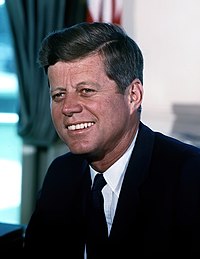John F. Kennedy
From Wikipedia, the free encyclopedia
"JFK", "John Kennedy", and "Jack Kennedy" redirect here. For other uses, see JFK (disambiguation), John Kennedy (disambiguation), and Jack Kennedy (disambiguation).
35th President of the United States, serving from January 1961 until he was assassinated in November 1963.After military service as commander of Motor Torpedo Boats PT-109 and PT-59 during World War II in the South Pacific, Kennedy represented Massachusetts' 11th congressional district in the U.S. House of Representatives from 1947 to 1953 as a Democrat. Thereafter, he served in the U.S. Senate from 1953 until 1960. Kennedy defeated Vice President and Republican candidate Richard Nixon in the 1960 U.S. presidential election. At age 43, he was the youngest to have been elected to the office,[2][a] the second-youngest president (after Theodore Roosevelt), and the first person born in the 20th century to serve as president.[3] A Catholic, Kennedy was the only non-Protestant president, and was the only president to have won a Pulitzer Prize.[4] Events during his presidency included the Bay of Pigs Invasion, the Cuban Missile Crisis, the Space Race—by initiating Project Apollo (which would culminate in the moon landing), the building of the Berlin Wall, the African-American Civil Rights Movement, and early stages of the Vietnam War. Therein, Kennedy increased the number of military advisers, special operation forces, and helicopters in an effort to curb the spread of communism in South East Asia.[5] The Kennedy administration adopted the policy of the Strategic Hamlet Program which was implemented by the South Vietnamese government. It involved certain forced relocation, village internment, and segregation of rural South Vietnamese from northern and southern communist insurgents.[6]
Kennedy was assassinated on November 22, 1963, in Dallas, Texas. Lee Harvey Oswald was accused of the crime and arrested that evening, but Jack Ruby shot and killed him two days later, before a trial could take place. The FBI and the Warren Commission officially concluded that Oswald was the lone assassin. However, the United States House Select Committee on Assassinations (HSCA) concluded that those investigations were flawed and that Kennedy was probably assassinated as the result of a conspiracy.[7] Kennedy's controversial Department of Defense TFX fighter bomber program led to a Congressional investigation that lasted from 1963 to 1970.[8] Since the 1960s, information concerning Kennedy's private life has come to light. Details of Kennedy's health problems with which he struggled have become better known, especially since the 1990s. Although initially kept secret from the general public, reports of Kennedy's philandering have garnered much press. Kennedy ranks highly in public opinion ratings of U.S. presidents


No comments:
Post a Comment